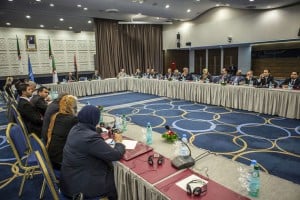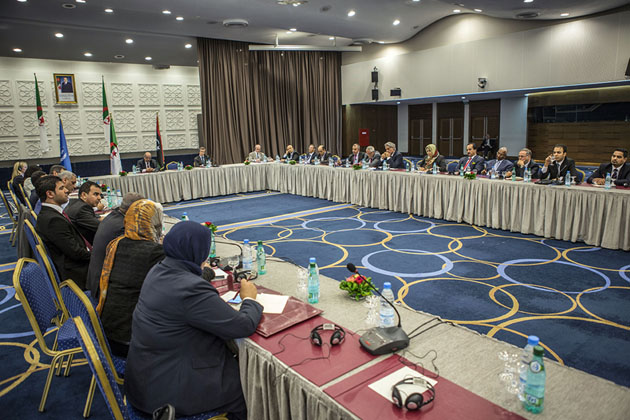By Hadi Foraji.

Tripoli, 3 June 2015:
In his hardest-hitting public speech to date, UNSMIL chief Bernardino Leon has warned that Libya has . . .[restrict]reached “ a moment of truth”. It was on the verge of ceasing to exist as a functioning state. He told politicians gathered in Algiers for a two-day meeting as part of the Dialogue, that while the two rivals continued to fight each other, the terror threat of IS was becoming ever more important.
With Ramadan approaching the choice had to be made between continued fighting and peace. “We are approaching the sacred month of Ramadan,” he said, “a moment of peace, a moment of reconciliation, a moment for the families to get together and celebrate together and I think this is always said about all the countries in the world, and especially true in the case of Libya”.
Leon spoke of the paradox that both the government and Libya Dawn were each fighting IS (Daesh). This showed very clearly, he said, “that those who have been accusing Fajr Libya (Libya Dawn) of being a terrorist organisation now see how some of the most important militias in Fajr Libya are fighting Daesh … It means that we all have to agree that Fajr Libya is not a terrorist organisation but an organisation that can share values with many of the people in the other camp and can join these efforts to preserve the Libyan unity, the Libyan sovereignty and to fight those like Daesh who aim at destroying the Libyan state”.
Leon continued: “But at the same time, it is important for Fajr Libya also to understand that if they can have this common enemy that aims at destroying democracy, at destroying this modern state that all Libyans want to build, it means that this narrative that says that those in Tobruk and in other regions are people from the previous regime who are against democracy is also wrong.
“It means that these shared values of building a modern and democratic state are not a monopoly of Fajr Libya and other organisations but can be shared by all those present in both camps”.
Leon said that Libya now really was at the limit. As soon as six weeks, the Central Bank of Libya would very probably be unable to pay salaries. Libyan administration in both Beida and Tripoli would be faced with collapse.
Oil production had dropped, he said, but even if it recovered to 2011 levels, it would not be able to sustain the budget deficit that Libya needs to maintain its public finances.
And while the rivals argued about negotiating positions, the threat from Daesh continued the rise. Everyone involved in the different tracks of the Dialogue needed to understand that they could no longer be seeking concessions from the other side. It needed to be understood, said Leon, that Libya had reached the limit. It was on the verge of becoming a failed state.
As evidence of this imminent failure, Leon pointed out that although an inherently rich country, Libya was currently receiving humanitarian aid from its neighbours.
“Many Libyans keep telling us that in a rich country, one of the richest countries in this region, it is unacceptable to see in many cities that people cannot have food or medicines; that brother countries in the region and in the international community have to send this international aid as if Libya was a poor country” said Leon.
The limited money that Libya was still earning “ is going to people who are killing each other and who at the same time are fighting this threat coming from Daesh. And this is even more difficult for Libyans in the street to understand”.
Leon continued: “Libyans are telling us very clearly that enough is enough and the time has come to make this agreement. We don’t want any more political debates about this small question here or there, we want the people who are negotiating to think of all Libya and to think especially of the Libyan people that is suffering”.
The UNSMIL chief accepted that there were still amendments that could be made to the Third Draft of the political agreement that he produced last month. But he warned that this should be considered as the final document. If there were 20 drafts, maybe the perfect agreement would be reached but he said that Libya’s rivals did not have the time for further negotiations. The country was on the verge of collapse and the Daesh menace was growing. Libya was coming close to ceasing to exist as a functioning country.









